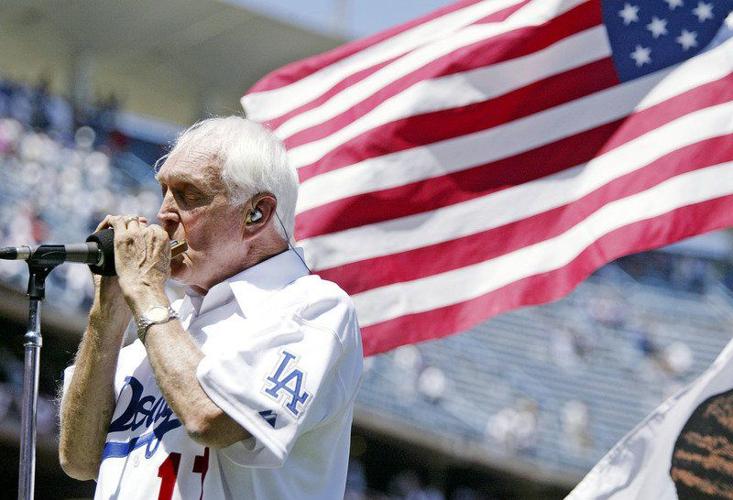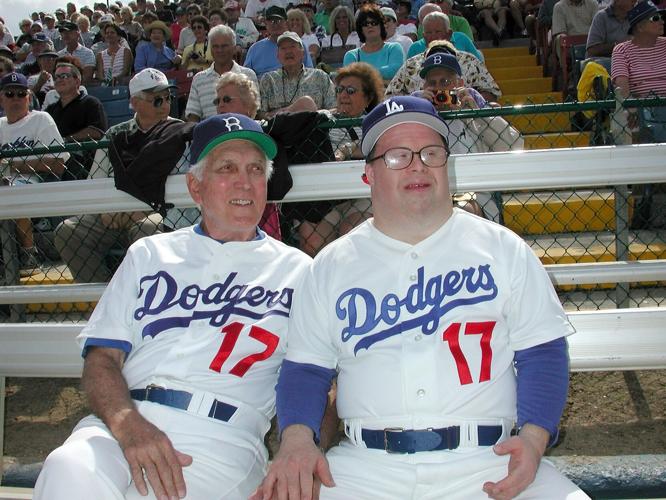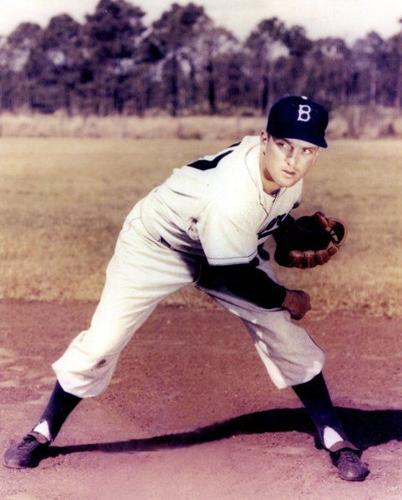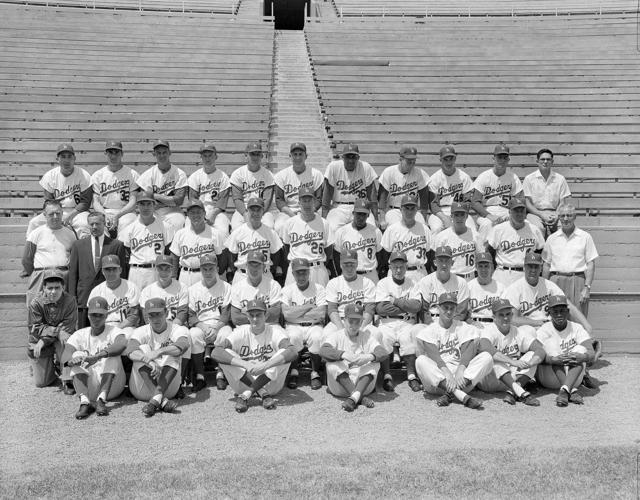ANDERSON, Ind. — The Major League Baseball career of Carl Erskine reaped two no-hitters and a World Series strikeout record while spanning the geographical breadth of the United States across 12 seasons.
A street in Brooklyn carries the name of Erskine, who spent most of his career pitching at Ebbets Field in the New York City borough. He also pitched — and won — the first game the Dodgers played in the Los Angeles Coliseum in 1958 when the majors expanded to the West Coast.
Beyond his athletic career, Erskine’s life revealed many qualities that made him so much more than just a great baseball player. Foremost, Erskine was an advocate for social justice as a friend and teammate of Jackie Robinson, who broke the Major League Baseball color barrier.
The father of a boy with Down syndrome, Erskine also became a pioneer in the Special Olympics movement to provide opportunities for people with developmental disabilities.
Erskine, who was born Dec. 13, 1926, died Tuesday morning at the age of 97 in Anderson with family by his side.
After he graduated from Anderson High School in 1945, Erskine’s baseball ambitions were put on hold when he was drafted into the U.S. Navy. He soon was scouted by the Dodgers, left the Navy and signed a baseball contract.
Erskine joined the Dodgers in July 1948. Before his major league career ended in 1959, Erskine had won 122 games and lost 78, struck out 981 batters, pitched more than 1,718 innings, thrown two no-hitters and set a World Series single-game record with 14 strikeouts.
All the while, he and his wife, Betty, maintained their home in Anderson, Indiana, and began raising their family, which would grow to include four children. The youngest, Jimmy, was born in 1960 with Down syndrome.
“We got to be old enough when the Dodgers moved to Los Angeles that (brother) Dan and I could go to the games without Mom,” Erskine's son Gary recalled. “We’d run around the clubhouse. Then, during the game, we’d sit in the first row behind the dugout so Dad could keep an eye on us.”
In the 1953 season, Erskine won 20 games and set the World Series strikeout record. He pitched in 11 World Series games, though the Dodgers won only one world championship in Brooklyn, in 1955. He received another World Series ring in 1959 after his active retirement.
One of his books about his baseball experiences, “What I Learned from Jackie Robinson,” details his friendship with the man who broke baseball’s color barrier. While Erskine’s cordial relationship with Robinson and his family was atypical for that time period, his early friendship in Anderson with a Black boy named Johnny Wilson, who later played for the Harlem Globetrotters, had paved the way by creating in Erskine an attitude that racial differences were unimportant.
After Jimmy's birth, Erskine became keenly aware of injustices against people with developmental disabilities. Encouraged to institutionalize their son, Carl and Betty refused.
Erskine was approached by Eunice Kennedy Shriver, President John F. Kennedy’s sister, to help promote the fledgling Special Olympics movement, which had begun in 1968. That became a passion of the Erskines, who were instrumental in Special Olympics fundraising efforts locally, statewide and nationally.
“Special Olympics in Madison County would not have existed without him,” Paul Gray, who led the local chapter of Special Olympics for many years, said in the early 2010s. “He took the first group of athletes to Terre Haute (Indiana, for state competition) in 1970 before anybody in the county knew about Special Olympics.”
Erskine's success as a Dodgers pitcher, coupled with his advocacy for social justice, led to state and national accolades, all of which Erskine accepted with his trademark self-deprecation.
In 2015, after receiving Major League Baseball's Lifetime Achievement Award, Erskine quipped, "I got the call about the award about two weeks ago from Dan Foster, who is the head of the MLB alumni. I asked him why I was getting the award: Was it for giving up the longest home run of anyone in history?"
Eight years later, Erskine was honored again with a similar award, the Buck O’Neil Lifetime Achievement Award from the National Baseball Hall of Fame.
When Erskine became the seventh Hoosier to receive the state’s top award, the Sachem, in 2010, Indiana Gov. Mitch Daniels said, “If you get asked, as I often do, what’s a Hoosier? You can just say it’s this man. He’s the best we've got.”
Erskine was the subject of a chapter in Roger Kahn’s book, “The Boys of Summer,” about the Dodgers of his era. And he also penned books of his own, “Tales From the Dodger Dugout” in addition to “What I Learned from Jackie Robinson.”
An outgrowth of the latter was another book, “The Parallel,” concerning society’s growth on the fronts of race relations and people with disabilities.













